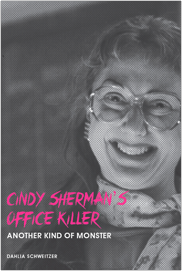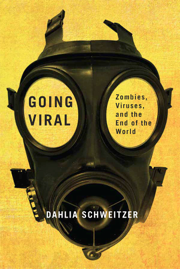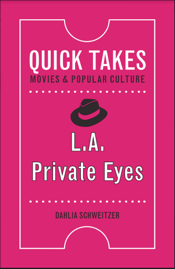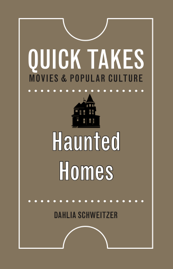
About Dahlia
DAHLIA SCHWEITZER is a pop culture critic, writer, and professor. Described by Vogue as “sexy, rebellious, and cool,” Schweitzer writes about film, television, music, gender, identity, and everything in between. She studied at Wesleyan University, lived and worked in New York City and Berlin, and completed her MA and PhD at the Art Center College of Design and UCLA. She is currently chair of the Film and Media department at the Fashion Institute of Technology in New York City.
In addition to her books, Dahlia has essays in publications including Cinema Journal, Journal of Popular Film and Television, Hyperallergic, Jump Cut, Quarterly Review of Film and Video, and The Journal of Popular Culture. She has also released several albums of electronic music, including Plastique and Original Pickup.

Professor
As a professor of film and media studies, Dahlia exposes her students to a variety of theoretical approaches and cinematic techniques, asking them to approach both with analytical inquisitiveness. Her aim is to pass her own curiosity on to her students, encouraging them to think across their classes and experiences to create intellectual connections between course materials and the world in which they live. She strives to remind her students that the loudest voice is not necessarily correct, and in so doing, helps them find their own.

Media Critic
Declared “one of the world’s leading analysts of popular culture” by renowned author Toby Miller, Dahlia writes about film, television, music, gender, identity, and everything in between. Her work can be found across mainstream, academic, and emergent channels in both long and short form. Repeatedly drawn to popular culture, Dahlia loves to analyze and unpack cultural artifacts in order to explore how they reflect social and historical issues, as well as looking at how they reinforce or interrogate common cultural assumptions.

Author
Dahlia has written numerous books exploring aspects of film and television. Regardless of the topic—serial killers, private detectives, or even zombies—all of her writing engages directly with questions of self versus other, private versus public space, examining depictions of gender, identity, and race. She traces how these depictions evolve and examines what they mean about our changing world. In her latest project, Dahlia explores the ways haunted homes have become a venue for dramatizing anxieties about family, gender, race, and economic collapse.
Blog
Why the Truth Matters to the Menendez Brothers (but Clearly Not to Netflix)
I tried. I made it to the start of episode four, but then I had to give up. I feel terrible for trying, and I feel terrible for not trying hard enough (to finish) – mainly because then I can’t eloquently argue for how much worse it gets. But here we are. I watched three episodes of Netflix’s Monsters: The Lyle and Erik Menendez Story so that I can tell you not to. In his book Toward a Theory of True Crime Narratives, Ian Punnett defines the characteristics of true...
The Menu: Bored, Tired People Being Terribly Violent
Warning: SPOILERS. Anya Taylor-Joy as Margot and Nicholas Hoult as Tyler in The Menu (Mark Mylod, 2022). “In her absolutely splendid novel Alif the Unseen, G. Willow Wilson has a character ask whether a given book counts as eastern literature. In reply, Vikram the Vampire says, ‘There is a very simple test. Is it about bored, tired people having sex?’ When the character confirms that the book does, Vikram proclaims it western literature. It’s terribly clever, but omits...
From Glamour to the Grotesque: How the Black Dahlia Became a Sex Icon and Changed the Way We Think About Death
“The death of a beautiful woman is, unquestionably, the most poetical topic in the world.”—Edgar Allan Poe WARNING: Graphic photos and descriptions within. Seventy-six years ago, almost to the day, a passerby discovered the body of 22-year-old Elizabeth Short in a vacant lot in Southwest Los Angeles. In what has now become the stuff of legend, Short’s body had been carefully prepared and displayed for maximum impact. Her face had been sliced open from the corners of her mouth to her ears,...




